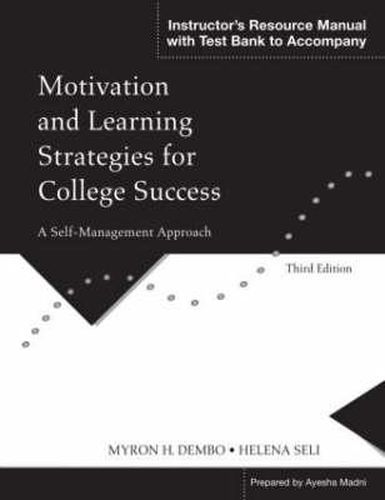Readings Newsletter
Become a Readings Member to make your shopping experience even easier.
Sign in or sign up for free!
You’re not far away from qualifying for FREE standard shipping within Australia
You’ve qualified for FREE standard shipping within Australia
The cart is loading…






If you haven’t used Motivation and Learning Strategies for College Success in your study skills course, it’s time for a change! This popular text combines theory, research, and applications to teach college students how to become more self-directed learners. Study skills are treated as a serious academic course. Students learn about human motivation and learning as they improve their study skills. The text does not offer recipes for success or lists of quick tips. The focus is on relevant information and features designed to help students to identify the components of academic learning that contribute to high achievement, to master and practice effective learning and study strategies, and then to complete self-management studies whereby they are taught a process for improving their academic behavior. A framework organized around six components related to academic success (motivation, methods of learning, time management, control of the physical and social environment, and monitoring performance) makes it easy for students to understand what they need to do to become more successful in the classroom. The pedagogical features include: exercises that help students observe and evaluate their own learning and study skills; follow-up activities that guide students to apply the content to their own academic learning; designated Follow-Up Activities that help students identify topics to include in Self-Management Studies; appendices provide information on how to conduct these studies, and examples of studies conducted by students in a learning to learn course; student reflections that allow students to read about the experiences of other students as they attempt to change their behavior and become more successful students; chapter-end reviews that provide a quick guide to specific procedures for implementing a given strategy; key points that highlight the important ideas presented in each chapter; and, a Glossary at the end of the book that defines important terms that are bolded in the text. New in the third edition: discussion of achievement motivation via four motivational student profiles; expanded treatment of sociocultural factors affecting motivation; new material on student identity issues (possible selves); extended discussion of the rational emotive approach to changing one’s emotions and using physical relaxation techniques; attention to use of time based on categorizing tasks into urgent and important; new coverage of social loafing and I-messages; and additional new exercises and follow-up activities. A separate Instructor’s Manual provides helpful information for teaching the material, including additional exercises and experiences for students, essay test questions, information on how students can maintain a portfolio to demonstrate their acquisition of learning and study skills, and guidelines for helping students complete a self-management study of their own behavior.
$9.00 standard shipping within Australia
FREE standard shipping within Australia for orders over $100.00
Express & International shipping calculated at checkout
If you haven’t used Motivation and Learning Strategies for College Success in your study skills course, it’s time for a change! This popular text combines theory, research, and applications to teach college students how to become more self-directed learners. Study skills are treated as a serious academic course. Students learn about human motivation and learning as they improve their study skills. The text does not offer recipes for success or lists of quick tips. The focus is on relevant information and features designed to help students to identify the components of academic learning that contribute to high achievement, to master and practice effective learning and study strategies, and then to complete self-management studies whereby they are taught a process for improving their academic behavior. A framework organized around six components related to academic success (motivation, methods of learning, time management, control of the physical and social environment, and monitoring performance) makes it easy for students to understand what they need to do to become more successful in the classroom. The pedagogical features include: exercises that help students observe and evaluate their own learning and study skills; follow-up activities that guide students to apply the content to their own academic learning; designated Follow-Up Activities that help students identify topics to include in Self-Management Studies; appendices provide information on how to conduct these studies, and examples of studies conducted by students in a learning to learn course; student reflections that allow students to read about the experiences of other students as they attempt to change their behavior and become more successful students; chapter-end reviews that provide a quick guide to specific procedures for implementing a given strategy; key points that highlight the important ideas presented in each chapter; and, a Glossary at the end of the book that defines important terms that are bolded in the text. New in the third edition: discussion of achievement motivation via four motivational student profiles; expanded treatment of sociocultural factors affecting motivation; new material on student identity issues (possible selves); extended discussion of the rational emotive approach to changing one’s emotions and using physical relaxation techniques; attention to use of time based on categorizing tasks into urgent and important; new coverage of social loafing and I-messages; and additional new exercises and follow-up activities. A separate Instructor’s Manual provides helpful information for teaching the material, including additional exercises and experiences for students, essay test questions, information on how students can maintain a portfolio to demonstrate their acquisition of learning and study skills, and guidelines for helping students complete a self-management study of their own behavior.